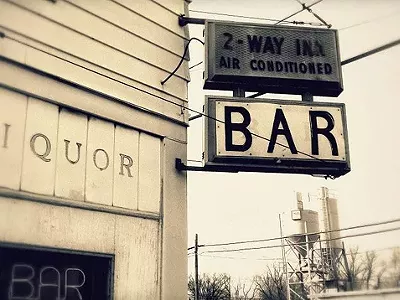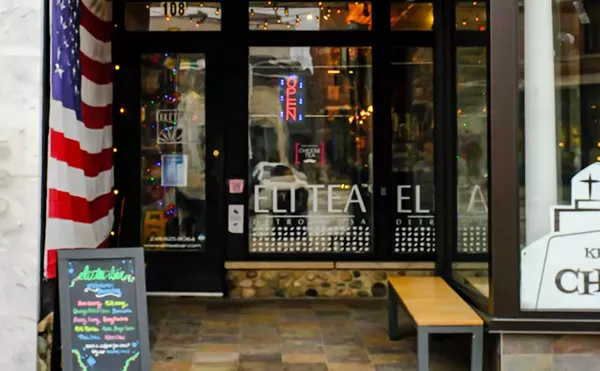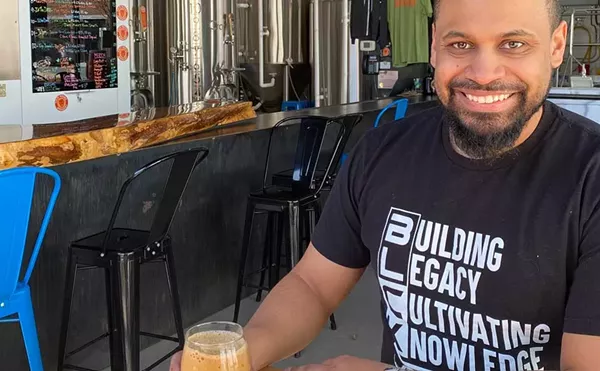Arbor Brewing Co. owners Matt and Rene Greff's decision to ask customers to chip in $75,000 via Indiegogo to upgrade ABC Microbrewery's piecemeal, partly outdoor kitchen to a safer, enclosed space, has sparked a lively discussion among customers and business associates in the Ann Arbor area.
Some labeled the campaign and the Greffs "scummy." Others swore off ABC's beer altogether. And many more simply muttered their disapproval, especially as posts celebrating the couple's globetrotting popped up on social media, and they diverted resources to help open a brewery in Bangalore, India.
At the heart of that debate was the ethics of crowdfunding campaigns and the question: When does it become unethical for an established business to turn to sites like Kickstarter and Indiegogo to fund basic improvements or expansions?
But ABC went beyond that gray area. A current employee who wished not to be identified tells the Metro Times that the Greffs charted new territory by pressuring staff earning less than a living wage ($9 an hour) to help pay to improve their own work conditions in a kitchen that lacked basics, like walls.
The staffer says employees were then asked to solicit funds from family and friends, and each was given an individual link to the Indiegogo page that would monitor their pull.
Then, with the goal met, the Greffs pink-slipped the kitchen staff.
As that unfolded, it was also revealed to MT that the Greffs have yet to pay back a dime to investors who in 2003 helped finance ABC Microbrewery's 2006 opening. Mark Maynard, a widely read Ypsilanti blogger, and former Ypsilanti City Councilmember Barry LaRue say they, along with others, each put up at least $10,000 and signed a repayment plan stating investors would triple their money by 2016.
All told, the Greffs have on their hands a kitchen staff that felt it was underpaid for working in blizzards and other "miserable" conditions; investors who are now going to the media over delayed disbursements; and customers, neighboring business owners, and kitchen staff upset they were asked to fund a kitchen renovation — while the owners sipped drinks in first-class on Delta — just days before the layoffs.
All that came as a bit of a surprise to many who view ABC Microbrewery as a socially conscious enterprise that serves as a community hub, and it raises questions about how some businesses might exploit the growing and genuine desire to buy from ethical local producers or fund worthy enterprises.
As a consequence, some employees, investors, and other supporters are expressing their resentment and disappointment, seeing ABC as, at best, insincere, and, at worst, highly unethical.
'Walls and stuff'
On the question of the campaign, critics contend that ABC grossed $1.7 million in 2013 between the nearly 20-year-old ABC BrewPub in Ann Arbor and 8-year-old ABC Microbrewery (formerly the Corner Brewery) in Ypsilanti. They believe that, with those funds, ABC should have been able to find money in the pot to at least make basic improvements to the kitchen over the last five years instead of delaying the work, then asking customers to pony up for "walls and stuff" (to quote the Greffs' Indiegogo page).
Rene Greff defended the campaign with the explanation that ownership has yet to draw a paycheck from ABC Microbrewery, banks won't loan, and that funds are already tied up in expanding the distribution operation.
The breweries' supporters mostly argued on various online forums that if one doesn't like the Indiegogo campaign, one needn't donate. And, in the end, the supporters spoke the loudest with their donations, boosting the Greffs just beyond their $75,000 goal in the campaign's final days.
But the campaign, working conditions, Indian venture, and the bosses' posh vacations were all especially galling to the staffer who spoke to MT, who outlined the kitchen's issues.
Cooks worked outdoors, making flipping burgers an especially unenviable job while temperatures sat below freezing for months.
The indoor portion lacked a ventilation system, causing it to regularly fill thick with smoke. Flat grills malfunctioned, new equipment shorted the old circuit boxes, and food was kept cold with dry ice for months when a commercial refrigerator broke, the staffer reports.
Given the wages and working conditions, the staffer says, he was shocked when Rene Greff gathered the bar and kitchen employees for a team meeting and asked for contributions to the Indiegogo campaign, wooing them with prizes like a brick with their name written on it — with a Sharpie.
"It was honestly infuriating. We're working for $9 an hour, 20 to 30 hours a week, not making enough to buy groceries. While we work we have to breathe in smoke, it's either too cold or it's too hot when we're outside. Then having your boss come up and say, 'Donate $5, $10, $15, because this is a good business.' Well, no, this isn't a good business."
He says ABC's Ann Arbor employees expressed reservations about donating to the cause, so Greff told Ypsilanti's ABC Microbrewery staff, "I want to address this right now: You should feel free to donate to the company."
And that's when she lost the crowd, he says.
"Everyone had the same look of, 'No fucking way!'"
Out of eight kitchen employees, one company man and a manager donated $5. The employee didn't get his name written on a full brick, however. Instead, it ended up on half of a brick.
"There's the idea that [the Greffs] have these three businesses that seem to be doing well, yet we can't have a functioning kitchen. Now paying for one is [the staff's] responsibility because the owners couldn't handle it."
Rene Greff pins the blame for the situation on the employees, who she says asked to start cooking outdoors when the brewery expanded its menu, adding that the campaign is a result of ownership wanting to provide a quality work environment. She says the improvements couldn't be done one at a time over the last five years and had to be pulled into one project.
"Our corporate culture is all about creating a positive work environment for our staff," Greff says. "We tend to pay better than average for a restaurant, we offer discounts on food and beer, benefits — we take good care of our people."
She adds that employees weren't forced to contribute to the campaign and says the layoffs were necessary because the kitchen closed for repairs.
Brian Guerriero, ABC's kitchen manager, concedes the work environment could be "very uncomfortable" and "sometimes inconvenient," but stresses that the staff wasn't forced or pressured to donate.
Our staffer scoffed at the idea that employees wanted to cook outdoors during last winter's polar vortex, and at the Greffs' assertion that there was no pressure to donate to the campaign, pointing out that gathering employees in a room and explaining why it's OK to donate is pressure in itself.
Compounding the overall resentment was Matt Greff's ill-timed Facebook posts announcing the Greffs' world travels.
On Aug. 12 2014, during the Indiegogo campaign, Greff posted to Facebook, "Winter seems to be shaping up nicely. Miami, Barbados, India, Belgium, Italy, Poland." He followed that up on Sept. 12 by posting a Romney-esque photo of Rene and him with big, toothy grins on an airplane toasting Bloody Marys. "So happy to be back on Delta with an upgrade and pre-takeoff bloodies," read the caption. (Both posts have since been removed from his page.)
Naturally, that didn't sit well with the employees who were just asked to help fund the kitchen build-out, then laid off.
Exit clause
The ABC Microbrewery is well-loved in Ypsilanti, as evidenced in it meeting its Indiegogo goal where other businesses have fallen short in similar campaigns, and few breweries can match the sense of community and warmth offered there. It hosts events from local mayoral campaign parties to indie art shows. Atop both Greff breweries are large solar installations, and the ABC's storage shed is cooled with geothermal energy. In many regards, it's a model local business.
And that's what investors in Ypsilanti and Ann Arbor envisioned funding when they put up cash in 2003 to get the brewery off the ground.
But the two investors who spoke with MT wanted to clarify that they have no say over crowdfunding campaigns or working conditions, and they are troubled that they have seen no return on their investments, despite the business appearing to thrive.
Former Ypsilanti City Councilman LaRue lives several blocks from ABC and invested $15,000 in the concept. Disbursements were to start in 2006 and LaRue was to receive three-and-a-half times the initial investment by 2016, he says, but adds he and other investors have yet to receive a check and remain largely in the dark.
Still, LaRue is "extremely happy with the presence of the brewery" that put a formerly empty and deteriorating industrial building back on the tax rolls. Like most in the area, he sees ABC Microbrewery as a unique place around which a community developed.
"Those were all things we wanted to support. We had a naïve approach thinking this was going to be a symbiotic investment," he says. "The people taking the risk and encouraging that would benefit, along with the community, and Matt and Rene. Ownership has seemingly done OK. It appears the investors have not. It is a fact, we have invested money and not seen a return."
Maynard invested $10,000 and, like LaRue, he says the investment's outcome "is not what I had hoped for."
"I'm disappointed because it feels like things could have been handled better. Unfortunately the investors had no input on any of this and how it went down. When they launched, there was a lot of goodwill, and the reason we invested, and a lot of people invested, was because it's a big place that's family friendly and sells beer ... and there was an abundance of goodwill. But now I feel like, with some of these things coming to light — now it's going to dry up."
Rene Greff bristled when asked about the investors and asserts ownership has yet to draw a check from the 11-year-old business.
"We can't make money out of thin air. You call up and ask, 'Why aren't you paying your staff better? Why aren't you paying for your own kitchen build-out?' You don't seem to get it that there is a limited amount of money in this business and we're doing the best with what we have," she says. (All kitchen staff received a $1 per hour raise in December, several weeks after MT began interviewing sources for this story.)
Greff added that the investors' contracts hold an exit clause, and the investors, who are owners, unlike the banks, can find the door if they don't like what they see.
"Unfortunately owners are the last ones to get paid because that's the way a business works."
But do any of the issues truly matter? The beer hall is still full, investors' cash is still with the company, and our staffer will continue preparing ham and cheddar pretzel rolls in a new kitchen mostly funded by customer donations. There's no complaint over what the brewery and its staff contribute to the community, but there's no doubt that many directly and indirectly involved with the business feel "the way a business works" is worth a discussion.







